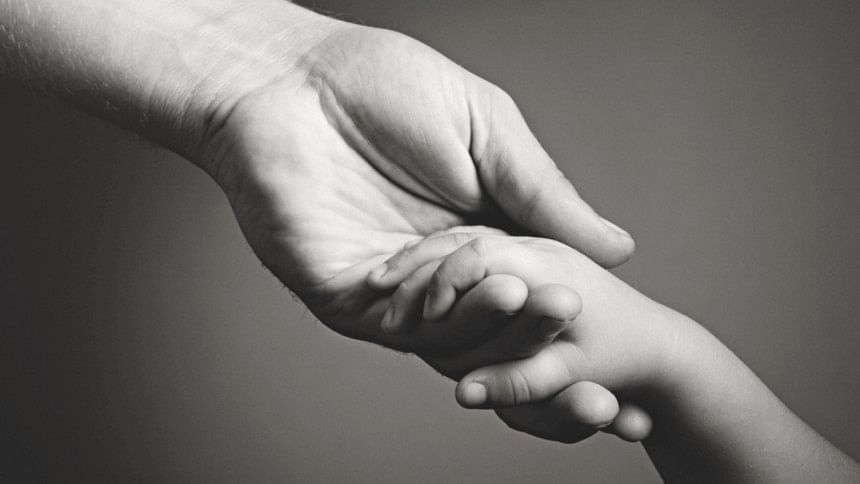Our Relationships With Our Fathers

I text my father, "Happy Father's Day, baba." while he's in the next room. I do this because I'm not sure how else to wish him, and I'm worried if he'll even appreciate the gesture.
The relationship we have with our fathers is beyond complicated, especially compared to the other familial relationships we maintain. Fathers tend to conform to the social narrative that they have to be emotionally distant. While there's no denying the existence of many supportive fathers, many of them conform to this particular stereotype in our society.
It often looks like a lack of proper communication and emotional conversations. A private candidate, Semona Sajjad, opens up about how she sees her father, "I grew up watching my dad fulfil his 'role' in our family and that was about it. I'm sure he cares for me a lot, but we don't really talk."
Other times, it's a lack of acceptance. Ayman Muktadir*, a student of IBA, explains why he never got along with his father. "Our relationship is mostly of non-interference, and we've only grown more distant over the years due to our different beliefs. Furthermore, I didn't choose the path he wanted for me career-wise." This might sound like a typical clash of ideologies between a son and a father, but the effects are genuinely concerning. Ayman continues on how it affected him as a person, "I'm very closed off emotionally because I believed bottling up emotions was the way. That's not the situation I'd like my child to grow up in if I ever become a father. For what it's worth, I'll not become my father."
On the other hand, the result of having a healthy bond with our fathers can be drastically different.
Arpita Das, an NGO worker, says, "My father supported my passion for poetry and would listen to me recite for hours on end. Now, I feel fearless performing in front of hundreds. His encouragement has left that powerful of an impact on me." She also mentions how the qualities she observed in her father helped her choose a caring life partner. "He was a very sensitive man. The way he treated my mother shaped the idea of a relationship in my mind which was healthy and respectful."
This goes to show the depth of influence our fathers can have on our entire lives. Having positive reinforcement at home makes a child sure of themselves, and this belief stays throughout our lives. This is especially true because we see our fathers as someone we can look up to, since we learn to understand the very emotion itself. To know that someone believes in you provides a sense of security. We carry this assurance for the rest of lives. It doesn't matter how old we grow, the idea that someone thought we were smart enough or patient enough, can comfort us on our worst days.
The inability to be understood by a family member can be disheartening. Unlike our mothers and siblings, they've never experienced emotional vulnerability from their fathers and can't express it themselves. As long as they believe that they're correct, the vicious cycle goes on.
It's rather sad how we crave their affection and a few tender words at times. At the end of the day, a child needs the simple reassurance of love and acceptance. Trying to fulfil their expectations (and failing) can be greatly frustrating, because their preemptive ideas of us aren't generally what we become. Although our lives are ours only, it's painful to feel like you've failed someone you want to make proud. And it's a pain we carry with us for a very long time.
It's very difficult to understand their point of view, let alone come to terms with it. But it gets easier when we actively try and see why they do what they do. It's not important to know if the logic behind their decisions are correct but it's enough once we see why they think it's right. This peeking inside their minds or at least the attempt to, can help us justify certain actions and words that might've hurt us. While they're not always right, knowing that they work a specific way because of what they've seen allows us to make peace with certain behaviours.
To try and tackle the wall between us and our fathers, we need to take the first step. We're the generation of transition; and now, we must show them how to be expressive. We teach them as they taught us once: by doing it ourselves. It can be in the form of a side hug or a straightforward, 'How was your day?' Initially, it might be baffling for them, but we need to continue assuring them that it's okay to be openly caring.
Of course, it's not easy by any means - it'll take courage to overcome the fear of being rejected and it'll take patience to teach someone so experienced. More importantly, understanding where they come from isn't going to solve the problems for everyone realistically, but it's worth a try.
My father replies, "Thanks baba!" He's still in the next room, a walk away. This interaction is awkward, and unnecessary. But it's progress. Trying to understand him made me realise just how much I'm like him. It feels both frightening and heartwarming to feel so close to someone.
We've our own little ways to express love, and we navigate around our boundaries to convey how we feel. We're still trying to figure out this strange relationship. And that's okay. In between fighting for ice cream and checking up on each other, I realise that we'll be okay. Maybe I'll hug him next year and tell him that I love him, or maybe I'll call him from the next room. As long as there's a desire to see each other happy, we'll all find a way.
*Name changed for privacy.

 For all latest news, follow The Daily Star's Google News channel.
For all latest news, follow The Daily Star's Google News channel. 








Comments